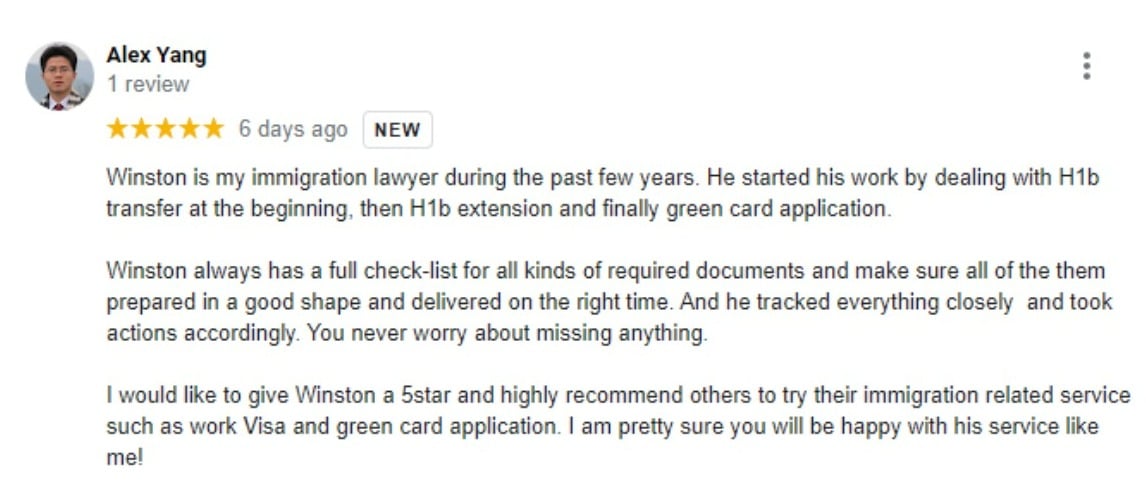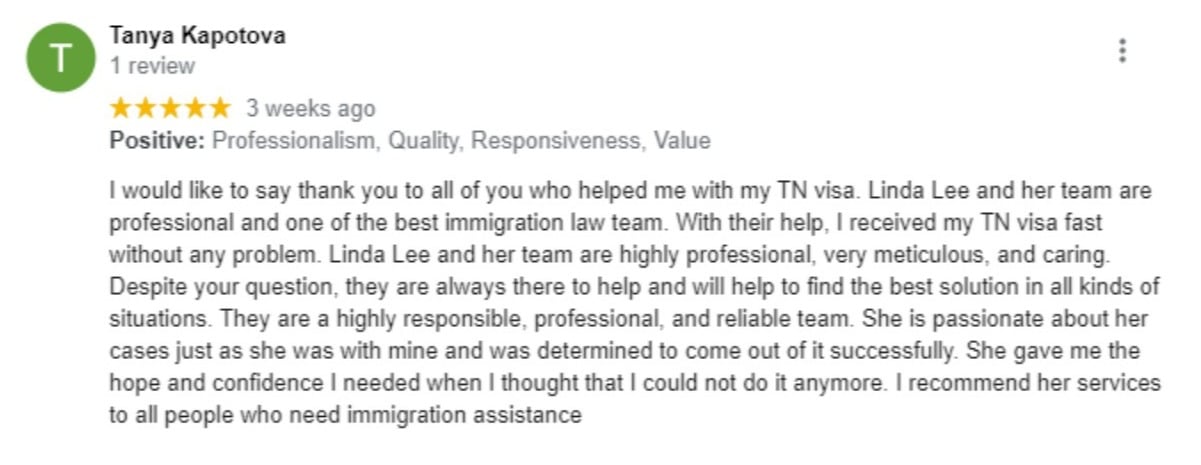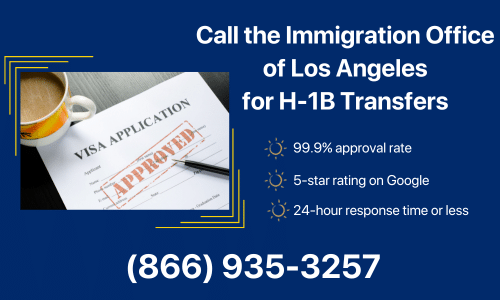Last Updated on April 8, 2024 by Linda Lee
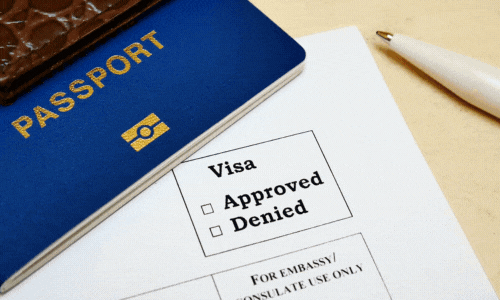
The goal of this H-1B transfer guide is to break down the process of transferring an employee’s H-1B visa into easy-to-understand steps. Our immigration attorneys created this guide to provide employers and employees with a roadmap to ensure a smooth transition while adhering to the regulatory framework set forth by the United States Citizenship and Immigration Services (USCIS).
Throughout this guide, we will delve into the key aspects of an H-1B status transfer, addressing critical questions such as eligibility criteria, required documentation, H-1B timelines, potential challenges, and best practices for a successful transfer. Whether you are an employer looking to hire international talent or an employee seeking to transition to a new job in the United States, this guide will serve as a valuable resource to facilitate a seamless H-1B transfer process.
By understanding the nuances of an H-1B transfer and following the appropriate steps, employers can harness the potential of a global workforce, while employees can navigate their professional journeys with confidence, knowing they have the tools and knowledge to make informed decisions.
We will unravel the complexities of transferring an employee’s H-1B visa and empower companies and individuals with the ability to unlock the true potential of global talent mobility. If you have any questions about this guide or the H-1B transfer process, please contact the Immigration Law Office of Los Angeles today at (213) 375-4084. We handle H-1B visa transfers nationwide.
In this guide:
- Understanding the H-1B Visa Transfer Process
- Initiating the H-1B Transfer
- Filing the H-1B Transfer
- Responding to USCIS Requests and Approvals for the H-1B Transfer
- Employee Responsibilities and Considerations
- Streamlining the H-1B Visa Transfer Process: Key Takeaways and Conclusion
- H-1B Visa Transfer FAQ
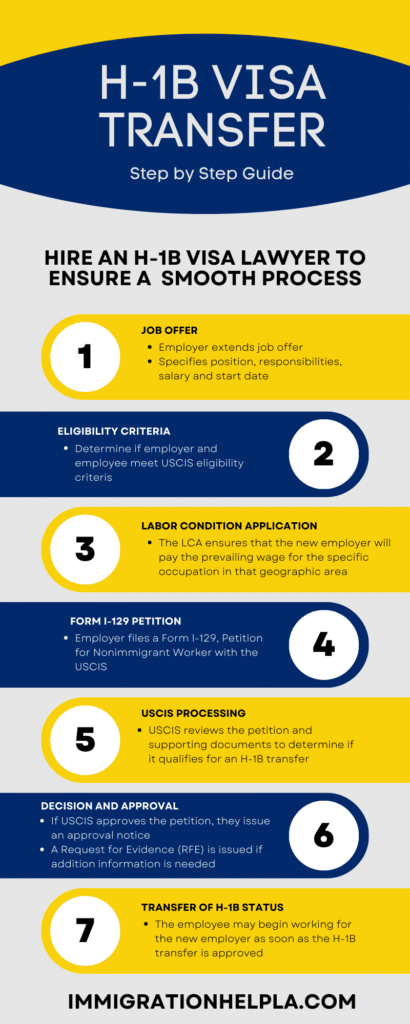
Share this Image On Your Site
Understanding the H-1B Visa Transfer Process
Overview of an H-1B Visa
The H-1B visa is a non-immigrant visa category in the United States that allows U.S. employers to temporarily hire foreign professionals in specialty occupations. It was established to address the shortage of skilled workers in certain fields and provides an avenue for companies to tap into global talent pools.
Key features of the H-1B visa include:
- Specialty Occupation: The H-1B visa is reserved for individuals who will be employed in a specialty occupation, which typically requires theoretical and practical knowledge in specialized fields such as science, engineering, computer programming, medicine, or finance. The job position must meet specific criteria, including a minimum educational requirement of at least a bachelor’s degree or its equivalent.
- Employer Sponsorship: To obtain an H-1B visa, the foreign professional must have a sponsoring U.S. employer. The employer must file a petition on behalf of the employee, demonstrating the need for their specialized skills and compliance with prevailing wage requirements.
- Numerical Cap: The H-1B visa program has an annual numerical cap on the number of visas available, with the majority of visas allocated through the regular cap and a smaller number reserved for individuals with advanced degrees from U.S. institutions. The cap, set by Congress, creates significant competition among employers and can lead to a lottery system for selection when the number of applications exceeds the available visas.
- Duration of Stay: H-1B visa holders are initially granted a period of authorized stay for up to three years, with the possibility of extension for an additional three years. In certain circumstances, extensions beyond the six-year maximum limit are available if the individual is in the process of obtaining permanent residency (green card) in the employment-based categories.
- Dependents: H-1B visa holders can bring their spouses and unmarried children under the age of 21 to the United States on an H-4 visa. H-4 visa holders are eligible for dependent status and may be eligible for employment authorization under certain circumstances.
Understanding the intricacies of the H-1B visa program, including the process of transferring an employee’s H-1B visa from one employer to another, is essential for both employers and employees to navigate the dynamic landscape of global workforce mobility. The guide that follows will delve into the details, providing comprehensive information and guidance on successfully transferring an employee’s H-1B visa while complying with the legal requirements outlined by the USCIS.
Reasons for H-1B Transfer
Various situations may necessitate the transfer of an employee’s H-1B visa from one employer to another. Understanding the common reasons for such transfers can help employers and employees navigate the process effectively. Here are some of the key reasons why individuals seek to transfer their H-1B visas:
- Change in Employment: One of the most common reasons for an H-1B visa transfer is when an employee wishes to switch employers. This could be due to better career prospects, a higher salary, improved work conditions, or the desire to explore new opportunities. By transferring the H-1B visa to the new employer, the employee can continue working in the United States without disruptions.
- Merger or Acquisition: In the event of a merger, acquisition, or corporate restructuring, companies may need to transfer the H-1B visas of their foreign employees to the new entity. This allows the continuation of employment for these individuals while ensuring compliance with immigration regulations. It is important to note that the new employer must assume the rights, responsibilities, and obligations of the existing H-1B visa sponsorship.
- Relocation to a Different Work Location: If an H-1B visa holder needs to relocate to a different work location within the United States, such as a different office branch or client site, an H-1B visa transfer may be necessary. The new work location must meet the criteria for a specialty occupation and comply with all relevant labor laws and regulations.
- Promotion or Change in Job Role: When an H-1B visa holder receives a promotion or a significant change in job responsibilities within the same company, an H-1B visa transfer might be required. This ensures that the visa remains valid for the new role and that the employee can continue working legally in the United States.
- Expiring Visa or Extension: If an H-1B visa is nearing its expiration date, both the employee and employer may decide to transfer the visa to a new employer during the extension process. This allows for continuous employment and provides an opportunity for the individual to explore new career prospects while maintaining lawful status.
- Dissatisfaction or Termination: In some cases, an H-1B visa holder may seek a transfer due to dissatisfaction with their current employer or facing termination. Transferring the visa to a new employer allows the individual to maintain lawful immigration status and continue working in the United States.
It is important to note that any H-1B transfer must comply with the regulations set by the USCIS, including filing the appropriate documentation and meeting eligibility requirements. Employers and employees should contact the Immigration Law Office of LA to ensure a smooth and compliant transfer process by visiting our contact page or calling us at (213) 375-4084.
In the next section of this guide, we will explore the eligibility criteria and necessary documentation for an H-1B visa transfer, equipping both employers and employees with the knowledge required to navigate this process successfully.
Initiating the H-1B Transfer
Confirming Eligibility for an H-1B Transfer
Before initiating the process of transferring an employee’s H-1B visa, it is crucial to ensure that both the employer and the employee meet the eligibility criteria set by the United States Citizenship and Immigration Services (USCIS). Verifying eligibility upfront can help streamline the transfer process and avoid unnecessary delays or complications. Here are the key factors to consider:
- Valid H-1B Visa Status: The employee must currently hold a valid H-1B visa and maintain lawful status in the United States. This means that the employee’s existing H-1B visa should not have expired or been revoked at the time of the transfer initiation.
- New Employer’s H-1B Sponsorship: The new employer must be eligible and willing to sponsor the H-1B status transfer. This involves filing a new H-1B petition on behalf of the employee, indicating the intent to employ them in a specialty occupation. The employer must be a legitimate U.S.-based entity with the capacity to fulfill the responsibilities of an H-1B visa sponsor.
- Specialty Occupation Requirement: The employee’s new job position with the sponsoring employer must meet the criteria of a specialty occupation. This typically requires a role that requires theoretical and practical application of highly specialized knowledge, with a minimum educational requirement of at least a bachelor’s degree or its equivalent. The job should also align with the employee’s skills, qualifications, and prior work experience.
- Prevailing Wage Compliance: The new employer must demonstrate compliance with the prevailing wage requirements for the specific occupation and geographic location. This involves offering the employee a salary that meets or exceeds the prevailing wage as determined by the U.S. Department of Labor.
- Maintaining Continuity of Employment: The H-1B status transfer process should be initiated before the employee’s current employment with the previous employer ends. This ensures continuity of employment and lawful status for the employee throughout the transfer process.
- Documentation and Supporting Evidence: Employers and employees must gather and submit the necessary documentation to support the H-1B status transfer. This typically includes the new employer’s H-1B petition, a copy of the employee’s current H-1B approval notice, educational credentials, a job offer letter, and any other relevant supporting evidence to establish the eligibility and authenticity of the transfer request.
It is important to note that each transfer case may have unique circumstances, and it is advisable to consult with an experienced immigration attorney at our office to navigate the specific requirements and procedures involved by calling (213) 375-4084 today.
Next, we will delve into the detailed documentation requirements, timelines, and best practices for a successful H-1B status transfer, providing a comprehensive roadmap to facilitate a seamless transition from one employer to another.
Documenting the H-1B Visa Transfer: Required Documentation and Timelines
Once the eligibility for an H-1B transfer has been confirmed, the next crucial step is to gather and prepare the required documentation. Submitting a complete and well-documented application package is essential to ensure a smooth and successful transfer process. Additionally, understanding the timelines involved in the H-1B transfer can help employers and employees plan accordingly. Here’s a breakdown of the necessary documentation and timelines:
- Documentation Required from the New Employer:
- Labor Condition Application (LCA): The LCA serves as a key component in the H-1B visa transfer process, ensuring compliance with labor and wage regulations and providing authorization for the employment of foreign workers.
- H-1B Transfer Petition: The new employer must file an H-1B transfer petition (Form I-129) with the USCIS on behalf of the employee. This petition serves as the official request to transfer the H-1B visa sponsorship from the current employer to the new employer.
- Supportive Evidence: The employer should provide supporting documentation to establish the legitimacy of the job offer and the nature of the specialty occupation. This may include a detailed job description, evidence of the employer’s financial stability, organizational structure, and relevant information about the company’s operations.
- Documentation Required from the Employee:
- Copy of Current H-1B Approval Notice: The employee should include a copy of their current H-1B approval notice (Form I-797) as evidence of their existing H-1B status.
- Passport and Visa Information: A valid passport and copies of the H-1B visa and I-94 Arrival/Departure Record should be provided.
- Educational Credentials: The employee must submit copies of their educational degrees, diplomas, and transcripts to demonstrate the fulfillment of the specialty occupation’s minimum educational requirements.
- Resume/Curriculum Vitae: A comprehensive resume or curriculum vitae outlining the employee’s work experience, skills, and qualifications should be included.
- Timelines to Consider:
- Filing Deadlines: The H-1B transfer petition should generally be filed before the employee’s current authorized period of stay expires or within the 60-day grace period following the termination of their previous employment.
- USCIS Processing Time: The processing time for H-1B visa transfer petitions varies and can range from a few weeks to several months. It is advisable to check the USCIS website for the most up-to-date processing times or consult with our immigration attorneys.
- Premium Processing: Employers may choose to expedite the processing of the H-1B transfer petition by opting for premium processing, which guarantees a response from the USCIS within 15 calendar days upon payment of an additional fee.
It is crucial to ensure that all forms and documentation are accurately completed, signed, and organized in accordance with the USCIS guidelines. Any errors or omissions could lead to delays or potential denial of the transfer petition.
Throughout the H-1B visa transfer process, open communication between the employer, employee, and legal counsel is essential. Regular updates and clear documentation exchange can help address any potential issues or queries from the USCIS, ensuring a smoother overall transfer experience.
In the subsequent sections of this guide, we will explore the H-1B visa transfer adjudication process, potential challenges, and best practices to increase the likelihood of a successful transfer.
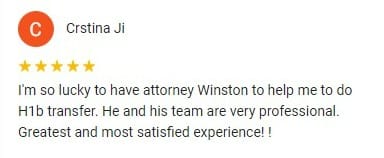
Filing the H-1B Transfer Petition
Filing the H-1B visa transfer petition is a critical step in the process of transferring an employee’s H-1B visa sponsorship to a new employer. This section will provide a step-by-step guide to help employers navigate the filing process successfully. It is important to note that the following steps are a general outline, and it is advisable to consult with an immigration attorney for specific guidance based on individual circumstances. Here’s a breakdown of the key steps involved:
H-1B Transfer Costs
The United States Citizenship and Immigration Services (USCIS) requires the payment of filing fees for the H-1B visa transfer petition. These fees are subject to change and should be verified on the USCIS website or by consulting with our team. The H-1B transfer filing fees typically include the base filing fee, the H-1B education and training fee, and the Fraud Prevention and Detection fee.
USCIS H-1B Transfer Fees
| H1B Transfer Fee | Amount |
| Basic filing fee for Form I-129 | $780 |
| The American Competitiveness and Workforce Improvement Act of 1998 (ACWIA) Fee | $750 – less than 25 full-time employees $1,500 – 25 or more full-time employees |
| Fraud Prevention and Detection Fee | $500 |
| Public Law Fee (114-113) | $4,000 *This fee is on if you employ more than 50 employees and more than half are in H-1B, L-1A, or L-1B immigration status |
| Premium Processing Fees (optional) | $2,805 |
Attorney Fees
Engaging the services of an experienced immigration attorney at the Immigration Law Office of Los Angeles is highly recommended during the H-1B transfer process. Our fees can vary depending on the complexity of the case and the services needed. We always provide a clear understanding of our attorney’s fee structure and will discuss the estimated costs upfront. Call us today if you have any cost questions at (213) 375-4084.
Potential Costs
Employees should also consider other potential expenses, such as travel costs for visa stamping or international travel related to the transfer process. These costs may include airfare, accommodation, transportation, and any necessary travel insurance.
It is crucial for employees and employers to discuss and clarify the financial responsibilities associated with the H-1B transfer upfront. Employers may choose to cover some or all of the costs, while in other cases, employees may be responsible for these expenses.
Additionally, it is advisable to maintain proper documentation of all expenses related to the H-1B status transfer process. This includes retaining copies of payment receipts, invoices, and any other relevant financial records, as these may be required for future reference or tax purposes.
Selecting the Appropriate USCIS Filing Method: Which Option is Right for You?
When filing an H-1B status transfer petition with the United States Citizenship and Immigration Services (USCIS), it is crucial to choose the appropriate filing method. The USCIS offers different options to submit the petition, each with its own considerations and requirements. Understanding the available filing methods can help employers and their legal counsel make an informed decision. Here are the common filing methods to consider:
Regular Processing:
Regular processing is the standard filing method for H-1B visa transfer petitions. It involves submitting the petition and supporting documentation by mail to the designated USCIS service center.
- Pros: Regular processing is typically less expensive than premium processing and allows employers to proceed with the transfer at a standard pace. It is suitable when there is no urgent need for an expedited decision.
- Cons: The processing time for regular processing can vary and may take several months. This longer processing time may impact the employee’s ability to begin work with the new employer promptly.
Premium Processing:
Premium processing offers expedited processing of H-1B visa transfer petitions for an additional fee of $2,805. It guarantees a response from the USCIS within 15 calendar days. The employer must file for premium processing if the H-1B visa holder is no longer working for the original employer before the transfer.
- Pros: Premium processing provides a faster decision, allowing employers and employees to receive a response on the transfer petition within a defined timeline. This can be beneficial when there is an urgent need for the employee to start working with the new employer.
- Cons: The additional fee associated with premium processing can be a financial consideration for employers. Additionally, while most petitions are processed within the 15-day timeline, in some cases, the USCIS may issue a request for evidence (RFE) within this period, extending the processing time.
Concurrent Filing:
Concurrent filing involves submitting the H-1B visa transfer petition along with a request for a change of status (if applicable) and an employment authorization document (EAD) application.
- Pros: Concurrent filing streamlines the process by combining multiple applications, such as the H-1B transfer petition, change of status, and EAD application. It allows for a coordinated and efficient submission of all required documents.
- Cons: Not all cases are eligible for concurrent filing, as it depends on the individual circumstances of the employee and the specific immigration benefits sought. It is essential to consult with legal counsel to determine if concurrent filing is appropriate.
Selecting the appropriate filing method depends on various factors, including the urgency of the transfer, the need for a quick decision, and budget considerations. It is recommended to consult with an experienced immigration attorney at our office to evaluate the specific circumstances and make an informed decision. Call us now at (213) 375-4084
Meeting the Deadlines and Requirements: Ensuring a Smooth H-1B Transfer Process
Successfully transferring an employee’s H-1B visa sponsorship to a new employer requires careful attention to deadlines and requirements set by the United States Citizenship and Immigration Services (USCIS). Failing to meet these deadlines or fulfill the necessary requirements can result in delays or even a denial of the transfer petition. To ensure a smooth H-1B visa transfer process, it is essential to stay organized, plan ahead, and adhere to the following guidelines:
- Understand USCIS Deadlines:
- Familiarize yourself with the USCIS deadlines for H-1B visa transfer petitions. These deadlines may vary depending on the employee’s current immigration status, employment start date, and other factors.
- Begin the transfer process well in advance to allow sufficient time for document gathering, preparation, and potential delays in processing.
- Prepare and Review Documents:
- Collect all required documents, such as the employee’s current H-1B approval notice, passport, educational credentials, and supporting evidence of the new job offer.
- Review each document thoroughly to ensure accuracy and completeness. Any inconsistencies or errors in the documentation can lead to complications or a request for further evidence from the USCIS.
- Verify Filing Fees and Payment Method:
- Determine the applicable filing fees for the H-1B visa transfer petition, including any additional fees for premium processing or concurrent filing, if applicable.
- Confirm the accepted payment method, such as check, money order, or credit card. Ensure that the payment is made in the correct amount and made payable to the appropriate entity (e.g., U.S. Department of Homeland Security).
- Organize and Assemble the Petition Package:
- Create a comprehensive petition package by organizing all the required forms, supporting documentation, and filing fees.
- Follow the USCIS guidelines for document assembly, including labeling each document, organizing them in a logical order, and providing a table of contents, if necessary.
- Track USCIS Updates:
- Monitor the USCIS website and subscribe to email updates to stay informed about any changes to filing requirements, processing times, or USCIS policies that may impact the H-1B visa transfer process.
- Check the USCIS case status online periodically after submitting the petition to track the progress and ensure there are no requests for evidence or other updates.
- Seek Legal Counsel:
- Consider hiring an experienced immigration attorney who specializes in H-1B visa transfers, like the attorneys at the Immigration Law Office of Los Angeles. We can provide valuable guidance, review the petition package, and address any legal concerns or questions that may arise.
- Working with our lawyers can help ensure compliance with USCIS requirements and increase the chances of a successful H-1B visa transfer.
By meeting the deadlines and requirements set by the USCIS, employers can help ensure a smooth and efficient H-1B visa transfer process. Thorough preparation, attention to detail, and collaboration with our law office can significantly contribute to a successful outcome. Give us a call at (213) 375-4084 to discuss your H-1B visa transfer today.
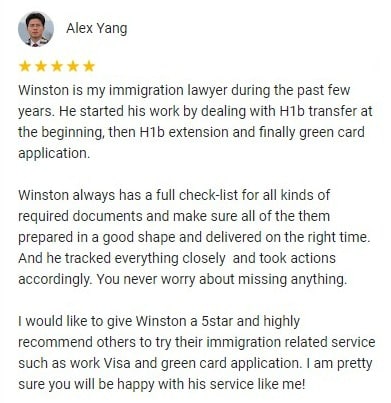
Responding to USCIS Requests and Approvals for the H-1B Transfer
Addressing Request for Evidence (RFE)
During the H-1B visa transfer process, it is not uncommon for the United States Citizenship and Immigration Services (USCIS) to issue a Request for Evidence (RFE) in response to the submitted petition. An RFE is a formal request for additional information or documentation to support the H-1B visa transfer application. Responding to an RFE promptly and effectively is crucial to ensure a successful outcome. Here are some key considerations when addressing an RFE:
Thoroughly Review the RFE:
- Carefully read and understand the content of the RFE. Take note of the specific evidence or information requested by the USCIS.
- Analyze the RFE in conjunction with the initial petition and compare it to ensure consistency and address any potential gaps or deficiencies identified by the USCIS.
Seek Legal Counsel:
- Call our experienced immigration attorneys who can provide guidance and support in crafting a comprehensive response to the RFE.
- Work closely with your attorney to understand the USCIS’s concerns and develop a strategic approach to address them effectively.
Gather Additional Supporting Documentation:
- Identify the specific evidence and documentation requested in the RFE. Compile a comprehensive package of additional supporting materials to address each point raised by the USCIS.
- Include any updated or additional information that strengthens the case for the H-1B visa transfer, such as detailed job descriptions, educational credentials, employer financial documentation, or testimonials from supervisors or colleagues.
Provide a Clear and Concise Response:
- Craft a well-organized and articulate response that directly addresses each request outlined in the RFE.
- Clearly explain how the additional evidence satisfies the USCIS’s concerns and provides further support for the H-1B visa transfer application.
- Ensure that the response is accurate, truthful, and consistent with the information provided in the initial petition.
Adhere to Deadlines:
- Pay close attention to the deadline specified in the RFE for submitting the response. Failure to meet the deadline may result in a denial of the H-1B visa transfer.
- Begin working on the response as soon as possible to allow ample time for gathering supporting documentation, reviewing drafts, and finalizing the response before the deadline.
Maintain Communication:
- Stay in regular communication with your attorney at the Immigration Law Office of Los Angeles throughout the process to seek guidance, address any concerns, and ensure a coordinated and cohesive response.
- Notify us promptly if there are any changes in circumstances that may affect the H-1B visa transfer or the response to the RFE.
Responding to an RFE requires attention to detail, thorough preparation, and a clear understanding of the USCIS’s concerns. By following these guidelines and working closely with our law office, employers can effectively address an RFE and increase the chances of a successful H-1B visa transfer.
Employee Responsibilities and Considerations
Employee’s Role in the H-1B Transfer Process: Collaboration and Compliance
The successful transfer of an H-1B visa to a new employer require active participation and collaboration from the employee. While the primary responsibility for initiating and managing the transfer rests with the employer and their legal counsel, employees play a crucial role in ensuring a smooth and efficient process. Here are some key areas where employees can contribute to the H-1B transfer process:
- Communication and Information Sharing:
- Employees should maintain open and transparent communication with their current and prospective employers regarding their intention to transfer their H-1B visa sponsorship.
- Provide all relevant information and documentation requested by both employers to facilitate the transfer process. This may include educational credentials, employment history, and personal identification documents.
- Cooperation with Legal Counsel:
- Employees should be available and responsive to inquiries from their employers’ legal counsel or the immigration attorney handling the transfer. Timely provision of information and documentation requested by legal counsel is vital for accurately preparing the H-1B transfer petition.
- Compliance with USCIS Requirements:
- Stay informed about the requirements and obligations associated with the H-1B visa, including maintaining valid status, adherence to work authorization conditions, and compliance with USCIS regulations.
- Notify the new employer and their legal counsel promptly of any changes in personal circumstances, such as a change of address, marital status, or employment details. Failure to report such changes may impact the H-1B transfer process.
- Preparation of Supporting Documents:
- Collaborate with the new employer and their legal counsel in preparing supporting documents required for the H-1B transfer petition. This may include providing accurate information for the job description, specialized knowledge, and any other relevant details regarding the offered employment.
- Timely Submission of Information:
- Respond promptly to requests for information or documentation from both current and prospective employers. Timely submission of requested materials is critical for meeting USCIS deadlines and ensuring a smooth transition of the H-1B visa sponsorship.
- Understanding Work Authorization Limitations:
- Get familiar with the terms and conditions of the H-1B visa, including any limitations or restrictions on employment, duration of stay, and permissible activities.
- Adhere to the work authorization limitations set by the H-1B visa to maintain compliance with USCIS regulations and avoid any potential issues during the transfer process.
Employees need to cooperate with their employers and legal counsel throughout the H-1B transfer process. By actively participating, providing accurate information, and complying with USCIS requirements, employees can contribute to a smooth and successful transfer of their H-1B visa sponsorship.
Potential Challenges and Mitigation Strategies
While the H-1B transfer process can be rewarding for employees, it can also come with some challenges. Being aware of these potential hurdles and having effective mitigation strategies in place can help employees navigate the process more smoothly. Here are some common challenges employees may encounter during the H-1B visa transfer and strategies to mitigate them:
Employment Gaps:
Challenge: There may be a period of time between the termination of employment with the current employer and the start date with the new employer, resulting in an employment gap.
Mitigation Strategies:
- Communicate with the new employer and their legal counsel to establish an appropriate start date that minimizes the employment gap.
- Explore options such as requesting a grace period or utilizing vacation time or unpaid leave to bridge the gap.
- Consider engaging in short-term professional development activities, volunteering, or pursuing additional educational opportunities during the employment gap to enhance your skills and maintain productivity.
Travel Restrictions and Visa Stamping:
Challenge: International travel during the H-1B visa transfer process can pose challenges, particularly if visa stamping is required.
Mitigation Strategies:
- Consult with the immigration lawyer to assess the potential risks and restrictions associated with international travel during the transfer process.
- If possible, postpone international travel until the H-1B transfer is completed, and the new visa has been obtained.
- If travel is necessary, ensure all relevant documentation, including the new employer’s H-1B transfer approval notice, is readily available and carry copies of essential documents during travel.
Immigration Status Validity:
Challenge: The expiration of the current H-1B visa status while the transfer process is ongoing can cause uncertainty.
Mitigation Strategies:
- File the H-1B visa transfer petition with the USCIS as early as possible to allow for processing time and minimize the risk of a status gap.
- If the transfer is still pending when the current H-1B visa status expires, work closely with the new employer and their legal counsel to explore options such as applying for a change of status or an extension to maintain lawful status in the United States.
Maintaining Clear Communication:
Challenge: Miscommunication or lack of communication between employees, employers, and legal counsel can lead to delays and misunderstandings.
Mitigation Strategies:
- Establish open lines of communication with both the current and new employers and their respective legal counsel throughout the transfer process.
- Regularly update all parties involved on any changes in personal circumstances, travel plans, or documentation requirements.
- Seek clarification if any instructions or requirements are unclear, and promptly address any concerns or questions that may arise.
Adapting to a New Work Environment:
Challenge: Transitioning to a new employer and work environment can bring its own set of challenges, such as adjusting to new policies, procedures, and team dynamics.
Mitigation Strategies:
- Proactively engage with the new employer to understand their expectations, workplace culture, and any specific requirements or procedures.
- Establish open lines of communication with colleagues and supervisors, seeking guidance when needed and building relationships within the new team.
- Leverage resources and support networks available within the new organization to facilitate a smooth transition and foster a positive work environment.
By anticipating potential challenges and implementing effective mitigation strategies, employees can navigate the H-1B visa transfer process with greater ease. It is important to maintain proactive communication, seek guidance when needed, and work closely with employers and our lawyers to address any challenges that may arise.
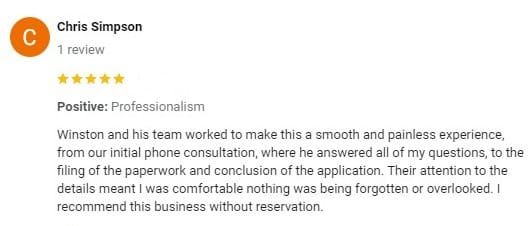
Streamlining the H-1B Visa Transfer Process: Key Takeaways and Conclusion
To summarize, the H-1B visa transfer steps are:
- Job Offer: The new employer should extend a job offer to the H-1B holder, specifying the position, job responsibilities, salary, and start date.
- Eligibility: Before continuing with the H-1B transfer, it is critical to determine if the eligibility criteria set by the United States Citizenship and Immigration Services (USCIS) are met by the employer and the employee.
- Labor Condition Application (LCA): The new employer needs to file a new Labor Condition Application (LCA) with the U.S. Department of Labor (DOL). The LCA ensures that the new employer will pay the prevailing wage for the specific occupation in the geographic area where the employee will work.
- Form I-129 Petition: The new employer files a Form I-129, Petition for a Nonimmigrant Worker, with U.S. Citizenship and Immigration Services (USCIS). This form includes information about the new employer, the H-1B employee, and the job details. Supporting documents such as the job offer letter, copies of educational degrees, resume, and relevant certifications should also be included.
- USCIS Processing: USCIS reviews the Form I-129 petition and supporting documents to determine if the new job qualifies for H-1B visa classification and if the employee meets the eligibility requirements. USCIS may issue a Request for Evidence (RFE) if additional documentation or clarification is needed.
- Decision and Approval: If USCIS approves the Form I-129 petition, they issue an approval notice. This notice confirms that the H-1B transfer has been approved, and the employee can begin working for the new employer on the requested start date.
- Transfer of H-1B Status: The employee may begin working for the new employer as soon as the H-1B transfer is approved. There is no need to wait for the physical approval notice to start working, as long as the employee has a valid H-1B visa or maintains lawful nonimmigrant status in the U.S.
Navigating the H-1B visa transfer process can be a complex undertaking, but with careful planning, collaboration, and adherence to the requirements set by the United States Citizenship and Immigration Services (USCIS), it is possible to achieve a successful transfer. In this guide, we have covered essential aspects of the H-1B visa transfer process, providing insights into the reasons for transfer, eligibility criteria, filing procedures, and considerations for employees.
Employers and employees must recognize the importance of hiring one of our experienced immigration attorneys to guide you through the intricacies of the process. Our lawyers can offer invaluable expertise, ensuring that all documentation is accurate, complete, and submitted in a timely manner.
Effective communication and collaboration between employees, employers, and our law office are crucial for a smooth and efficient transfer. By maintaining open lines of communication, promptly responding to requests, and addressing any concerns or changes in circumstances, the H-1B visa transfer process can progress with minimal disruptions.
While challenges may arise throughout the process, careful preparation and mitigation strategies can help overcome these hurdles. By hiring our law office, adhering to deadlines, and ensuring compliance with USCIS requirements, employees can increase their chances of a successful transfer.
Furthermore, understanding the financial implications of the H-1B visa transfer is essential for both employers and employees. By clarifying financial responsibilities and properly planning for associated costs, potential financial burdens can be mitigated.
In conclusion, the H-1B visa transfer process requires careful attention to detail, thorough preparation, and collaboration among all parties involved. By following the guidelines outlined in this guide and hiring our immigration law office, employers and employees can navigate the process with confidence and maximize the chances of a successful H-1B visa transfer.
Remember, immigration laws and procedures are subject to change, so it is essential to stay updated on the latest information and consult with our team to ensure compliance and a successful H-1B visa transfer. Call us today at (213) 375-4084 for a successful H-1B transfer.
H-1B Visa Transfer Frequently Asked Questions
Are H-1B visa transfers subject to the annual quota or lottery?
H-1B visa transfer petitions are not subject to the annual H-1B visa quota or lottery. The quota and lottery system typically apply to new H-1B visa petitions filed by employers seeking to hire foreign workers who have not previously held an H-1B visa.
However, it’s important to note that if the H-1B visa holder has already exhausted the maximum duration of their H-1B status (usually six years), they may be subject to the quota if they are seeking a new H-1B visa after a break in their H-1B status, known as the “cap gap” provision. In such cases, the employer would need to file the H-1B petition within the annual quota and subject to the lottery.
But for regular H-1B transfers from one employer to another, where the individual already holds an H-1B visa and is maintaining lawful status, the transfer is not subject to the quota.
Can an employee transfer their H-1B visa while the extension or amendment is pending?
Yes, an H-1B visa can be transferred multiple times throughout the holder’s authorized stay in the United States. Each transfer requires a new petition filed by the new employer.
Can an H-1B visa be transferred more than once?
Yes, an H-1B visa can be transferred multiple times throughout the holder’s authorized stay in the United States. Each transfer requires a new petition filed by the new employer.
Can the employee work for the new employer while the H-1B transfer is pending?
If the employee has an existing H-1B visa and is transferring it to a new employer, they can generally begin working for the new employer as soon as the H-1B transfer petition is filed with USCIS. This is known as “H-1B portability.” However, it’s recommended to consult with an immigration attorney at the Immigration Law Office of Los Angeles to ensure compliance with the specific requirements and regulations in your case.
Can the employee transfer their H-1B visa if they are currently outside the United States?
Yes, an H-1B visa transfer can be completed even if the employee is currently outside the United States. The process typically involves the new employer filing a new Form I-129 petition on their behalf, which, upon approval, will allow the employee to obtain an H-1B visa at a U.S. consulate or embassy in their home country.
What is form G-28 and does the employer need to file it?
When an individual chooses to have legal representation in their immigration case, they can complete and file Form G-28 to officially notify the immigration authorities about their attorney or accredited representative. It’s important to consult with the immigration attorneys at our law office for personalized guidance on completing and filing Form G-28 and to understand the specific requirements and forms applicable to your case.
How do I check my H-1B transfer status?
You can check the status of your H-1B transfer by visiting egov.USCIS.gov. You will need your receipt number which is a unique 13-character identifier that consists of three letters and ten numbers. Do not include dashes when entering your receipt number.
H-1B Transfer Success Stories
Our clients are very important to us and we love getting reviews from happy clients. Read some of our H-1B transfer success stories below.

